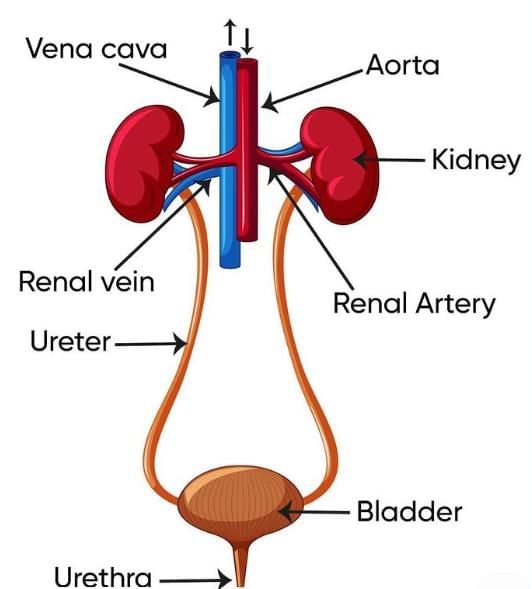The Excretory System | Year 9 Biology (Cambridge) - Class 9 PDF Download
Excretory System
The excretory system is responsible for removing waste products and maintaining fluid balance in the body. It consists of several organs that work together to achieve these functions.
Organs of the Excretory System
- Kidneys: Filters blood to remove waste products and excess substances, producing urine.
- Ureters: Transport urine from the kidneys to the bladder for storage.
- Bladder: Stores urine until it is eliminated from the body during urination.
- Urethra: Passageway through which urine exits the body.
 Excretory System
Excretory System
Functions of the Excretory System
- Filtration: Kidneys filter blood to remove waste products like urea, creatinine, and uric acid.
- Reabsorption: Process where substances such as water, glucose, and ions are reabsorbed from the renal tubules back into the bloodstream.
- Secretion: Movement of substances from the bloodstream into the renal tubules to be excreted as urine.
- Elimination: Discharge of urine from the body through the urethra.
Processes in the Nephron
The nephron is the functional unit of the kidney where filtration, reabsorption, and secretion occur:
- Filtration: Blood enters the nephron, and waste products are filtered out into the renal tubules.
- Reabsorption: Essential substances such as water and ions are reabsorbed back into the bloodstream.
- Secretion: Additional substances like drugs and excess ions are secreted into the renal tubules for elimination.
Hormonal Regulation
- ADH (Antidiuretic Hormone): Regulates water reabsorption in the kidneys to maintain water balance in the body.
- Aldosterone: Controls sodium and potassium levels in the blood, influencing water balance and blood pressure regulation.
Impact on Homeostasis
The excretory system helps maintain internal balance in several ways:
- Waste Removal: Eliminates metabolic waste products to prevent toxin buildup.
- Fluid Balance: Regulates water and electrolyte levels to maintain proper hydration and blood pressure.
- Acid-Base Balance: Controls pH levels in the body through the excretion of hydrogen ions and bicarbonate.
Common Disorders
- Kidney Stones: Hard deposits of minerals and salts that form inside the kidneys.
- Urinary Tract Infections (UTIs): Infections in any part of the urinary system, often caused by bacteria.
- Renal Failure: Loss of kidney function, requiring dialysis or kidney transplant for treatment.
Examples
- When you drink a lot of water, your kidneys produce more urine to maintain proper hydration.
- Diuretics increase urine production by affecting kidney function, helping to reduce fluid retention.
Conclusion
The excretory system plays a crucial role in maintaining overall health by eliminating waste products and regulating fluid balance in the body. Understanding its functions and the organs involved helps in appreciating its importance in maintaining homeostasis.
|
9 videos|14 docs|4 tests
|
FAQs on The Excretory System - Year 9 Biology (Cambridge) - Class 9
| 1. What are the main organs of the excretory system? |  |
| 2. What are the functions of the excretory system? |  |
| 3. How is the excretory system hormonally regulated? |  |
| 4. What are some common disorders of the excretory system? |  |
| 5. What is the role of the bladder in the excretory system? |  |





















